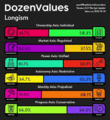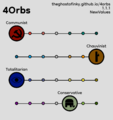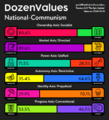 |
Self Insert "People can really believe anything these days!" - Ismism This page is meant to represent FargothGares's political views. Please do not make any major edits without their permission. |
 |
Work in Progress "I'll be done any day now!" - Still-Being-Drawnism This page is not done yet and may still contain inaccurate information or miss important details. |
![]() National Wodenism or Fargothism, are the politics of
National Wodenism or Fargothism, are the politics of ![]() FargothGares. It is a
FargothGares. It is a ![]() Fascist ideology catered towards
Fascist ideology catered towards ![]() English nationalism and
English nationalism and ![]() separatism, influenced by the
separatism, influenced by the ![]() Spanish,
Spanish, ![]() British and
British and ![]() Italian Fascists with its
Italian Fascists with its ![]() technocratic,
technocratic, ![]() corporatist and
corporatist and ![]() organic system of government. It is also
organic system of government. It is also ![]() economically far-left, espousing an economy formed on
economically far-left, espousing an economy formed on ![]() National Syndicalist principles. Its core goals are the creation of an
National Syndicalist principles. Its core goals are the creation of an ![]() English Republic and a revival in
English Republic and a revival in ![]() Fyrnsidu. It stands staunchly opposed to
Fyrnsidu. It stands staunchly opposed to ![]() Abrahamic reaction
Abrahamic reaction ![]() as well as
as well as ![]() Secular progressivism
Secular progressivism ![]() .
.
 Political Journey
Political Journey 
I wasn't very political but I definitely leaned very very moderately left, had a favourable opinion of the monarchy and disliked religion.
I became to be more politically aware, and I took a great disliking to the Liberal Party, the USA and the Murdoch media, and believed authoritarian measures were justified in curbing their influence, while also becoming rabidly Reddit religion-wise. My love for the monarchy moved from just liking the aesthetics to thinking it was something that gave Australia identity, and I felt that republicanism would Americanise Australia. Don't ask how the house of Windsor would co-exist with state atheism btw
Really my transitionary phase to Fascism, I just called myself a third positionist because I thought fascism was inherently christian (??????????)
I became a Republican and a Pagan towards the end of this phase
![]() Third Position
Third Position
I had come to realise that I shared much in common with Fascism and reading into it I began to find it rather agreeable. Becoming a Pagan helped to push me in the direction of English diaspora nationalism.
I was mostly the same as I am now, the biggest difference is that I am for class conflict rather than collaboration. My worst takes from this period was that I used to be sympathetic to zionism and electoralism.
![]() Fascism
Fascism
I realised that electoralism as a path to fascism was unreasonable, and this also influenced my economic views and I embraced a revolutionary, working class-oriented Fascism.
 England a Nation
England a Nation 
 Defining the Nation
Defining the Nation 
National Wodenism embraces a ![]() classical interpretation of nationalism, defining it as a combination of various characteristics including
classical interpretation of nationalism, defining it as a combination of various characteristics including ![]() ethnicity,
ethnicity, ![]() culture,
culture, ![]() language, as well as
language, as well as ![]() religion. National Wodenism summarises the English nation in three points:
religion. National Wodenism summarises the English nation in three points:
- The Faith, being
 Fyrnsidu, "Old Customs" in Old English - the English strand of Germanic Paganism.
Fyrnsidu, "Old Customs" in Old English - the English strand of Germanic Paganism. - The Blood, being the English, an admixture of Celtic Britons and Germanic invaders.
- The Soil, that being England, nothing greater, and nothing lesser.
National Wodenism critcises ![]() New World states, products of
New World states, products of ![]() European imperialism for being unable to form a national identity the same way Old World nations can. Supporting
European imperialism for being unable to form a national identity the same way Old World nations can. Supporting ![]() ethnopluralism and
ethnopluralism and ![]() universal nationalism, it believes that peoples should stick to their
universal nationalism, it believes that peoples should stick to their ![]() native faiths and
native faiths and ![]() native lands, and that there is an explicit lack of connection between the descendents of colonists and the land they reside - in contrast to the
native lands, and that there is an explicit lack of connection between the descendents of colonists and the land they reside - in contrast to the ![]() Native Americans or
Native Americans or ![]() Australians who have lived on that land and formed nations for thousands of years. National Wodenism rejects the idea of Anglosphere unity and posits that the only homeland of the English is England.
Australians who have lived on that land and formed nations for thousands of years. National Wodenism rejects the idea of Anglosphere unity and posits that the only homeland of the English is England.
 Anglo-Saxon?
Anglo-Saxon? 
Today, an aura of fear surrounds the term Anglo-Saxon. It is widely considered racist, not just to describe the ![]() English national identity and heritage, but even among so-called
English national identity and heritage, but even among so-called ![]() “intellectuals” of the school of
“intellectuals” of the school of ![]() mediaevalism referring to
mediaevalism referring to ![]() historical Anglo-Saxons. It is said that the English are truly a
historical Anglo-Saxons. It is said that the English are truly a ![]() Celtic people, in truth, 25-50% of the English gene pool is derived from the 5th century Germanic invaders and the modern Englishman is a unique mix of Briton and Angle/Saxon/Jute. The
Celtic people, in truth, 25-50% of the English gene pool is derived from the 5th century Germanic invaders and the modern Englishman is a unique mix of Briton and Angle/Saxon/Jute. The ![]() Romans and
Romans and ![]() Normans both left little to no genetic trace; their impact was entirely cultural and linguistic. As for the Celtic Britons, they left little cultural impact as they melted into the Anglo-Saxon culture, from which
Normans both left little to no genetic trace; their impact was entirely cultural and linguistic. As for the Celtic Britons, they left little cultural impact as they melted into the Anglo-Saxon culture, from which ![]() English language,
English language, ![]() laws,
laws, ![]() customs and so on are based in.
customs and so on are based in.
National Wodenism asserts the Anglo-Saxon identity of the English nation, calling for a ![]() national palingenesis for England
national palingenesis for England ![]() to do so. The most important aspect of this is the instatement of
to do so. The most important aspect of this is the instatement of ![]() Fyrnsidu as the state religion and into many areas of public life. A cultural and
Fyrnsidu as the state religion and into many areas of public life. A cultural and ![]() educational focus on celebrating the importance of the Anglo-Saxons will be greatly valued, and efforts to
educational focus on celebrating the importance of the Anglo-Saxons will be greatly valued, and efforts to ![]() de-romanticise the English language would be undertaken.
de-romanticise the English language would be undertaken.
 Dismantling Britain
Dismantling Britain 
First and foremost, the prerequisite to a ![]() reborn English nation will be the dismantling of the
reborn English nation will be the dismantling of the ![]() multinational entity that is the
multinational entity that is the ![]() United Kingdom, and the concept of a British "nation". With its origins entrenched in
United Kingdom, and the concept of a British "nation". With its origins entrenched in ![]() reactionary institutions as its very name states, the United Kingdom has worked not just to erode the culture and identity of the Celtic nations, but the English nation too, particularly in how it perceives itself. Call a Scot a Brit, and you better run as fast as you can, call an Englishman a Brit and he won't bat an eye. The idea of Britain is posited as a
reactionary institutions as its very name states, the United Kingdom has worked not just to erode the culture and identity of the Celtic nations, but the English nation too, particularly in how it perceives itself. Call a Scot a Brit, and you better run as fast as you can, call an Englishman a Brit and he won't bat an eye. The idea of Britain is posited as a ![]() shared identity, yet it merely serves as the
shared identity, yet it merely serves as the ![]() vehicle of Anglicisation of the whole British Isles. If other members of the Union reject the label, why should the English accept it? An
vehicle of Anglicisation of the whole British Isles. If other members of the Union reject the label, why should the English accept it? An ![]() independent English state is evidently necessary to maintain and revive the distinct English national identity.
independent English state is evidently necessary to maintain and revive the distinct English national identity.
National Wodenism too supports ![]() self-determination for the rest of the British Isles, supporting
self-determination for the rest of the British Isles, supporting ![]() Scottish and
Scottish and ![]() Welsh independence as well as
Welsh independence as well as ![]() Irish reunification. As for the
Irish reunification. As for the ![]() Cornish and
Cornish and ![]() the Manx, due to their small population and their assimilation, National Wodenism instead wants them to be recognised as native minorities within England and give them some degree of autonomy.
the Manx, due to their small population and their assimilation, National Wodenism instead wants them to be recognised as native minorities within England and give them some degree of autonomy.
 England on the World Stage
England on the World Stage 
The ![]() English state will have to, first and foremost, focus on its survival. Much like the
English state will have to, first and foremost, focus on its survival. Much like the ![]() DPRK, the new England would be an
DPRK, the new England would be an ![]() anti-American,
anti-American, ![]() anti-Capitalist
anti-Capitalist ![]() nationalist state surrounded and threatened greatly by
nationalist state surrounded and threatened greatly by ![]() American influence, as such
American influence, as such ![]() similar policies would have to be implemented. The state, upon establishing itself, would begin programs of
similar policies would have to be implemented. The state, upon establishing itself, would begin programs of ![]() militarisation, driven by political and revolutionary fervour.
militarisation, driven by political and revolutionary fervour.
England would remain neutral in most foreign affairs that don't directly concern it. The state would be unwilling to establish or join any international alliance, unless other nations move in the ![]() same ideological direction. The idea of a
same ideological direction. The idea of a ![]() Fascist International Congress, as was attempted in Montreux, 1934, based purely as a network of solidarity and support between states sharing the same struggle against the liberal system would be considered, especially if said like-minded states were on the
Fascist International Congress, as was attempted in Montreux, 1934, based purely as a network of solidarity and support between states sharing the same struggle against the liberal system would be considered, especially if said like-minded states were on the ![]()
![]() same archipelago
same archipelago ![]() .
.
Of the conflicts that National Wodenism does take a stance on:
 Israel, a settler-colonial state actively genociding and eroding the Palestinian people, dictating western states to follow its will, must be wiped off the face of the earth, along with all of its financiers and shills.
Israel, a settler-colonial state actively genociding and eroding the Palestinian people, dictating western states to follow its will, must be wiped off the face of the earth, along with all of its financiers and shills. Ukrainians are not a nation, rather Ruthenians are;
Ukrainians are not a nation, rather Ruthenians are;  Russia is in the right as much of southeastern "Ukraine" is, well, Russian.
Russia is in the right as much of southeastern "Ukraine" is, well, Russian. The Democratic People's Republic of Korea is the legitimate state on the Korean Peninsula and should annex the
The Democratic People's Republic of Korea is the legitimate state on the Korean Peninsula and should annex the  Republic of Korea as soon as possible.
Republic of Korea as soon as possible.
 The Corporate State
The Corporate State 
![]() National Wodenism, like any
National Wodenism, like any ![]() Fascist ideology, seeks to establish a
Fascist ideology, seeks to establish a ![]() totalitarian and corporate state. It opposes the
totalitarian and corporate state. It opposes the ![]() divine right of kings, especially one claimed to be given by a
divine right of kings, especially one claimed to be given by a ![]() foreign god and defending the rule of a foreign house. National Wodenism believes that the
foreign god and defending the rule of a foreign house. National Wodenism believes that the ![]() monarchy is an
monarchy is an ![]() obsolete and
obsolete and ![]() lobotomised institution, a drain on the nation which must be abolished, and the royalty, much like the
lobotomised institution, a drain on the nation which must be abolished, and the royalty, much like the ![]() aristocracy and
aristocracy and ![]() bourgeoisie, are a privileged class with care only for their sectional interests that any true
bourgeoisie, are a privileged class with care only for their sectional interests that any true ![]() nationalist will want to rid the nation of.
nationalist will want to rid the nation of.
National Wodenism advocates for a bicameral ![]() parliamentary system, with the lower house being reformed, into one of
parliamentary system, with the lower house being reformed, into one of ![]() Corporations, filled with
Corporations, filled with ![]() representatives of industries, occupations and sciences, each governing their particular sphere and in a
representatives of industries, occupations and sciences, each governing their particular sphere and in a ![]() meritocratic and
meritocratic and ![]() technocratic structure. Parliamentary elections and
technocratic structure. Parliamentary elections and ![]() other political parties would be abolished, instead, a form of
other political parties would be abolished, instead, a form of ![]() syndical and organic democracy would be established, voting by occupation as opposed to locality, for your representative in the lower chamber. In place of the archaic
syndical and organic democracy would be established, voting by occupation as opposed to locality, for your representative in the lower chamber. In place of the archaic ![]() House of Lords, the new upper house would be composed of candidates selected from the Chamber of Corporations, serving as the closest advisors of the
House of Lords, the new upper house would be composed of candidates selected from the Chamber of Corporations, serving as the closest advisors of the ![]() Chancellor.
Chancellor.
Miscellaneous Opinions
- Similar to the DPRK, National Wodenism wants to introduce a nationally mandated operating system based on Linux called White Dragon OS, along with a national intranet replacing the internet.
- National Wodenism wants to renationalise the railways, including bringing back regional liveries based on historical ones and named locomotives (like some Class 40s and many steam locomotives were) for no reason other than it would be pretty hecking cool
Relations
 Good (7-10)
Good (7-10)
 Alstūdism (
Alstūdism ( /
/ /
/ /
/ /
/ ) - Quite happy I helped push you in this direction, I didn't think I would agree with someone politically this much. It's cool that we share
) - Quite happy I helped push you in this direction, I didn't think I would agree with someone politically this much. It's cool that we share  the same ideology, everything you say is very agreeable and you're an excellent writer and debater. The only difference really is that you're an irredentist and I'm a separatist, but that merely stems from the different circumstances of our countries. (10/10)
the same ideology, everything you say is very agreeable and you're an excellent writer and debater. The only difference really is that you're an irredentist and I'm a separatist, but that merely stems from the different circumstances of our countries. (10/10) Agricoetism (
Agricoetism ( /
/ /
/ /
/ /
/ ) - A fellow syndicalist and a Pagan, there's quite a lot of common ground, the main disagreements between are us is on the extent of the state, centralisation of the economy, ethnic nationalism and industrialism, but apart from those I consider you rather ideologically close to myself (8/10)
) - A fellow syndicalist and a Pagan, there's quite a lot of common ground, the main disagreements between are us is on the extent of the state, centralisation of the economy, ethnic nationalism and industrialism, but apart from those I consider you rather ideologically close to myself (8/10)
 Mixed (4-6)
Mixed (4-6)
 Immature Thought (
Immature Thought ( /
/ /
/ /
/ /
/ ) - I'm not too much a fan of your pan-nationalist and white nationalist tendencies, nor your eugenicism which I assume encompasses more than just the positive form. Our biggest areas of agreement are probably with ethnopluralism and on economics, you seem to be a third positionist of some kind, though i still take issue with permitting small business (5/10)
) - I'm not too much a fan of your pan-nationalist and white nationalist tendencies, nor your eugenicism which I assume encompasses more than just the positive form. Our biggest areas of agreement are probably with ethnopluralism and on economics, you seem to be a third positionist of some kind, though i still take issue with permitting small business (5/10) Cosmic Legionarism (
Cosmic Legionarism ( /
/ /
/ /
/ /
/ ) - There's much held in common ground, especially in being both Pagan third positionists; your economics, civics, social views are generally good, however we have major disagreements when it comes to your white (inter)nationalism and tripartism. While you have good takes on Abrahamic religion, I don't like your syncretism and occultism much. You are, I believe the only self-described National Socialist in this community who isn't a reactionary larper and that's respectable. (5/10)
) - There's much held in common ground, especially in being both Pagan third positionists; your economics, civics, social views are generally good, however we have major disagreements when it comes to your white (inter)nationalism and tripartism. While you have good takes on Abrahamic religion, I don't like your syncretism and occultism much. You are, I believe the only self-described National Socialist in this community who isn't a reactionary larper and that's respectable. (5/10) Pantheonism (
Pantheonism ( /
/ /
/ /
/ /
/ ) - You're not the worst, but some of your points such as world federalism, monarchism and sympathy to Israel are quite bad. Your economics are alright though. (4/10)
) - You're not the worst, but some of your points such as world federalism, monarchism and sympathy to Israel are quite bad. Your economics are alright though. (4/10) Vistulism (
Vistulism ( /
/ /
/ /
/ /
/ ) - When it comes to your economics, you are well a market socialist and rather moderate, but they are okay I suppose. The fact that you want to maintain the House of Lords and want to establish a third house instead of replacing the archaic aristocratic house is silly. I like that you too also want an independent England, but this being out of wanting to satiate other separatisms and not English nationalism is depressing. (4/10)
) - When it comes to your economics, you are well a market socialist and rather moderate, but they are okay I suppose. The fact that you want to maintain the House of Lords and want to establish a third house instead of replacing the archaic aristocratic house is silly. I like that you too also want an independent England, but this being out of wanting to satiate other separatisms and not English nationalism is depressing. (4/10)
 Bad (0-3)
Bad (0-3)
 Galaxaism(
Galaxaism( /
/ /
/ /
/ /
/ ) - I hope this is still accurate to your views as I am typing this; while you are a corporatist, your capitalism discounts me from looking upon your economics views positively. Despite identifying as a Canadian ultranationalist you are hesitant to reject the
) - I hope this is still accurate to your views as I am typing this; while you are a corporatist, your capitalism discounts me from looking upon your economics views positively. Despite identifying as a Canadian ultranationalist you are hesitant to reject the  sole threat to Canadian independence and embrace hawkish foreign policy. When it comes to your philosophy, I find much of it quite evil and I'm not sure if you actually believe in a lot of it. (3/10)
sole threat to Canadian independence and embrace hawkish foreign policy. When it comes to your philosophy, I find much of it quite evil and I'm not sure if you actually believe in a lot of it. (3/10) Distributist Reactionarism (
Distributist Reactionarism ( /
/ /
/ /
/ /
/ ) - Not really anything we can agree on, I am a modernist, pagan, nationalist while you are a reactionary, christian globalist. You have a few silly takes about synthesising liberal democracy with reactionaryism and other than that you're just a standard reactionary, only maybe a tiny bit of overlap in corporatist economics. (3/10)
) - Not really anything we can agree on, I am a modernist, pagan, nationalist while you are a reactionary, christian globalist. You have a few silly takes about synthesising liberal democracy with reactionaryism and other than that you're just a standard reactionary, only maybe a tiny bit of overlap in corporatist economics. (3/10) Nuriskianism (
Nuriskianism ( /
/ /
/ /
/ /
/ ) - I call you a
) - I call you a  "Left Quarkist" because like with Quark, I'm too retarded to understand your more esoteric takes, which share the subject of Capital. I'm not too into philosophy, but as that's a rather large part of your page, I can say it isn't very agreeable. Your Marxism is very much contradicted by your adherence to religion and nationalism (the latter being really one of the few things I appreciate about your ideology, even if a very moderate form of it). (3/10)
"Left Quarkist" because like with Quark, I'm too retarded to understand your more esoteric takes, which share the subject of Capital. I'm not too into philosophy, but as that's a rather large part of your page, I can say it isn't very agreeable. Your Marxism is very much contradicted by your adherence to religion and nationalism (the latter being really one of the few things I appreciate about your ideology, even if a very moderate form of it). (3/10) Caladanism (
Caladanism ( /
/ /
/ /
/ /
/ ) - Your civics are fine, though the presidential election aspect is a little odd. Economically there isn't too much to comment on, other than I'm against tripartism. Your pan-nationalism is pretty dislikable, and goes without saying I do not at all like your anti-Anglo sentiment with very silly and flimsy justifications. Socially, your views on women and marriage are gross and unreasonable and overall your sillyness is beyond comprehension (3/10)
) - Your civics are fine, though the presidential election aspect is a little odd. Economically there isn't too much to comment on, other than I'm against tripartism. Your pan-nationalism is pretty dislikable, and goes without saying I do not at all like your anti-Anglo sentiment with very silly and flimsy justifications. Socially, your views on women and marriage are gross and unreasonable and overall your sillyness is beyond comprehension (3/10) Mishism (
Mishism ( /
/ /
/ /
/ /
/ ) - There's not much I can say I like about your ideology, it's a combination of some of the worse kinds of anarchism. You're a chill dude and I would say the most agreeable sections are on social views and environmentalism. (2/10)
) - There's not much I can say I like about your ideology, it's a combination of some of the worse kinds of anarchism. You're a chill dude and I would say the most agreeable sections are on social views and environmentalism. (2/10) TIIKKETMASTER Thought (
TIIKKETMASTER Thought ( /
/ /
/ /
/ /
/ ) - Most of the stuff I see on your page is quite evil, I wasn't aware your influence from Kaczynski had moved away from luddism to just plain ruralism, but becoming a transhumanist is quite vile. Really the only part of your page I could find agreeable were some of the enviromentalist parts. (1/10)
) - Most of the stuff I see on your page is quite evil, I wasn't aware your influence from Kaczynski had moved away from luddism to just plain ruralism, but becoming a transhumanist is quite vile. Really the only part of your page I could find agreeable were some of the enviromentalist parts. (1/10) Lankajori Thought (
Lankajori Thought ( /
/ /
/ /
/ /
/ ) - Not much to agree on really, you're extremely capitalist libertarian and Christian which are things I am certainly no fan of, and I also don't like your ruralism either. The NAP is very very silly and your idea for a parliament is interesting. (1/10)
) - Not much to agree on really, you're extremely capitalist libertarian and Christian which are things I am certainly no fan of, and I also don't like your ruralism either. The NAP is very very silly and your idea for a parliament is interesting. (1/10) Brazilian Liberalism (
Brazilian Liberalism ( /
/ /
/ /
/ /
/ ) - You are the final boss of liberalism; your political views in just about every way are vile and there's really nothing I could say I agree with (0/10)
) - You are the final boss of liberalism; your political views in just about every way are vile and there's really nothing I could say I agree with (0/10)
 Brilliant
Brilliant 
 Good
Good 
 Alright
Alright 
 Benito Mussolini (
Benito Mussolini ( /
/ /
/ /
/ /
/ ) An obviously important figure in Fascism and a major influence, you were a great leader for Italy and put Fascism into practice, but still made too many compromises with the monarchists, conservatives and later on the Germans.
) An obviously important figure in Fascism and a major influence, you were a great leader for Italy and put Fascism into practice, but still made too many compromises with the monarchists, conservatives and later on the Germans. Oswald Mosley (
Oswald Mosley ( /
/ /
/ /
/ /
/ ) Despite being a really good writer and a big influence on me getting into Fascism, you were entrenched in an aristocratic background, and unlike the Italian Fascists who merely compromised their republicanism with the monarchy, your movement from the getgo were its staunchest defenders. Your defeatism in the face of the Germans is also quite negative.
) Despite being a really good writer and a big influence on me getting into Fascism, you were entrenched in an aristocratic background, and unlike the Italian Fascists who merely compromised their republicanism with the monarchy, your movement from the getgo were its staunchest defenders. Your defeatism in the face of the Germans is also quite negative.
 Middling
Middling 
 Eric Campbell (
Eric Campbell ( /
/ /
/ /
/ /
/ ) You were the forefront advocate of the Corporate State in Australia; your movement was closely tied to the British Union of Fascists and as such your views are inadequete in many of the same ways - defending the monarchy for example. What makes you worse than him is your economics being even more moderate than his and some of the absolutely retarded things you said, like denouncing the United Australia Party as "socialist" as well as claiming Lang Labor, the radically anti-Communist faction of the already succ-y Labor Party, had a "marxian mind".
) You were the forefront advocate of the Corporate State in Australia; your movement was closely tied to the British Union of Fascists and as such your views are inadequete in many of the same ways - defending the monarchy for example. What makes you worse than him is your economics being even more moderate than his and some of the absolutely retarded things you said, like denouncing the United Australia Party as "socialist" as well as claiming Lang Labor, the radically anti-Communist faction of the already succ-y Labor Party, had a "marxian mind". P.R. Stephensen (
P.R. Stephensen ( /
/ /
/ /
/ /
/ ) Pretty interesting figure, the idea of national socialists advocating for aboriginal rights is rather amusing, and the idea of a palingenesis surrounding their traditions is interesting. You are better than Campbell in terms of wanting to break from the British Empire, however the sympathy for Japan damages how I view your foreign policy. You and your movement were of communist roots and from what I can gather, your economics would probably be superior to Campbell's. No idea however how you are still a monarchist considering your foreign policy. Overall, between you and Campbell, I can't really pick one over the other, you both have quite significant flaws.
) Pretty interesting figure, the idea of national socialists advocating for aboriginal rights is rather amusing, and the idea of a palingenesis surrounding their traditions is interesting. You are better than Campbell in terms of wanting to break from the British Empire, however the sympathy for Japan damages how I view your foreign policy. You and your movement were of communist roots and from what I can gather, your economics would probably be superior to Campbell's. No idea however how you are still a monarchist considering your foreign policy. Overall, between you and Campbell, I can't really pick one over the other, you both have quite significant flaws.
 Inadequate
Inadequate 
 Bad
Bad 
 Disastrous
Disastrous 
 Literature
Literature 
Have Read
 - The Doctrine of Fascism
- The Doctrine of Fascism - Fascism: 100 Questions Asked and Answered
- Fascism: 100 Questions Asked and Answered - Fascism for the Million
- Fascism for the Million - The Land and the People
- The Land and the People - The New Road
- The New Road
Reading
Movements
Countries and movements that I support and would align myself with, modern or historical.
Comrades
 Levellers & Diggers (
Levellers & Diggers ( Great Britain, 1646-1651)
Great Britain, 1646-1651) French Revolution (
French Revolution ( France, 1789 –1799)
France, 1789 –1799) Kingdom of Italy (
Kingdom of Italy ( Italy, 1922-1943)
Italy, 1922-1943) Councils of National-Syndicalist Offensive (
Councils of National-Syndicalist Offensive ( Spain, 1931-1934)
Spain, 1931-1934) British Union of Fascists (
British Union of Fascists ( Great Britain, 1932-1940)
Great Britain, 1932-1940) Pērkonkrusts (
Pērkonkrusts ( Latvia, 1933-1944)
Latvia, 1933-1944) Falange de las JONS (
Falange de las JONS ( Spain, 1934-1937)
Spain, 1934-1937) Italian Social Republic (
Italian Social Republic ( Italy, 1943-1945)
Italy, 1943-1945) Democratic People's Republic of Korea (
Democratic People's Republic of Korea ( Korea, 1948-)
Korea, 1948-) 26th of July Movement (
26th of July Movement ( Cuba, 1955-1962)
Cuba, 1955-1962)
Mixed
Enemies
How I Would’ve Voted
Social Democracymaxxing
- 1901 -
 - No leader (Labor)
- No leader (Labor) - 1903 -
 - Chris Watson (Labor)
- Chris Watson (Labor) - 1906 -
 - Chris Watson (Labor)
- Chris Watson (Labor) - 1910 -
 - Andrew Fisher (Labor)
- Andrew Fisher (Labor) - 1913 -
 - Andrew Fisher (Labor)
- Andrew Fisher (Labor) - 1914 -
 - Andrew Fisher (Labor)
- Andrew Fisher (Labor) - 1917 -
 - Frank Tudor (Labor)
- Frank Tudor (Labor) - 1919 -
 - Frank Tudor (Labor)
- Frank Tudor (Labor) - 1922 -
 - Matthew Charlton (Labor)
- Matthew Charlton (Labor) - 1925 -
 - Matthew Charlton (Labor)
- Matthew Charlton (Labor) - 1928 -
 - James Scullin (Labor)
- James Scullin (Labor) - 1929 -
 - James Scullin (Labor)
- James Scullin (Labor) - 1931 -
 - Jack Lang (Lang Labor)
- Jack Lang (Lang Labor) - 1934 -
 - Jack Lang (Lang Labor)
- Jack Lang (Lang Labor) - 1937 -
 - John Curtin (Labor)
- John Curtin (Labor) - 1940 -
 - Jack Lang (Lang Labor)
- Jack Lang (Lang Labor) - 1943 -
 - John Curtin (Labor)
- John Curtin (Labor) - 1946 -
 - Jack Lang (Lang Labor)
- Jack Lang (Lang Labor) - 1949 -
 - Ben Chifley (Labor)
- Ben Chifley (Labor) - 1951 -
 - Ben Chifley (Labor)
- Ben Chifley (Labor) - 1954 -
 - H. V. Evatt (Labor)
- H. V. Evatt (Labor) - 1955 -
 - H. V. Evatt (Labor)
- H. V. Evatt (Labor) - 1958 -
 - H. V. Evatt (Labor)
- H. V. Evatt (Labor) - 1961 -
 - Arthur Calwell (Labor)
- Arthur Calwell (Labor) - 1963 -
 - Arthur Calwell (Labor)
- Arthur Calwell (Labor) - 1966 -
 - Arthur Calwell (Labor)
- Arthur Calwell (Labor) - 1969 -
 - Gough Whitlam (Labor)
- Gough Whitlam (Labor) - 1972 -
 - Gough Whitlam (Labor)
- Gough Whitlam (Labor) - 1974 -
 - Gough Whitlam (Labor)
- Gough Whitlam (Labor) - 1975 -
 - Gough Whitlam (Labor)
- Gough Whitlam (Labor) - 1977 -
 - Gough Whitlam (Labor)
- Gough Whitlam (Labor) - 1980 -
 - Bill Hayden (Labor)
- Bill Hayden (Labor) - 1983 -
 - Bob Hawke (Labor)
- Bob Hawke (Labor) - 1984 -
 - Bob Hawke (Labor)
- Bob Hawke (Labor) - 1987 -
 - Bob Hawke (Labor)
- Bob Hawke (Labor) - 1990 -
 - Bob Hawke (Labor)
- Bob Hawke (Labor) - 1993 -
 - Paul Keating (Labor)
- Paul Keating (Labor) - 1996 -
 - Paul Keating (Labor)
- Paul Keating (Labor) - 1998 -
 - Kim Beazley (Labor)
- Kim Beazley (Labor) - 2001 -
 - Kim Beazley (Labor)
- Kim Beazley (Labor) - 2004 -
 - Mark Latham (Labor)
- Mark Latham (Labor) - 2007 -
 - Kevin Rudd (Labor)
- Kevin Rudd (Labor) - 2010 -
 - Julia Gillard (Labor)
- Julia Gillard (Labor) - 2013 -
 - Bob Katter (KAP)
- Bob Katter (KAP) - 2016 -
 - Bob Katter (KAP)
- Bob Katter (KAP) - 2019 -
 - Bob Katter (KAP)
- Bob Katter (KAP) - 2022 -
 - Bob Katter (KAP)
- Bob Katter (KAP)
Social Democracymaxxing 2
Gallery
-
By Conor :)
-
By Hysteria :)
-
Hallo Borker, by
 Killer Kitty
Killer Kitty
-
By Quark :)
-
By Darkegg :)
-
GIF of all my DozenValues results
-
Compilation of my Sapplyvalues, darkest is oldest, lightest is newest
-
8Values
-
4Orbs
-
DozenValues
-
PolitiScales
-
9Axes
-
LeftValues
Comments
If you would like to be added to relations, add a comment here :3
| | |
| | |












